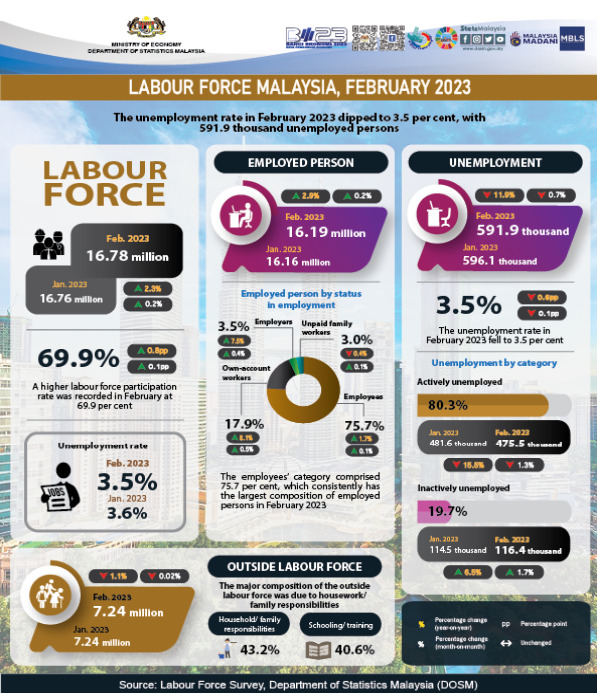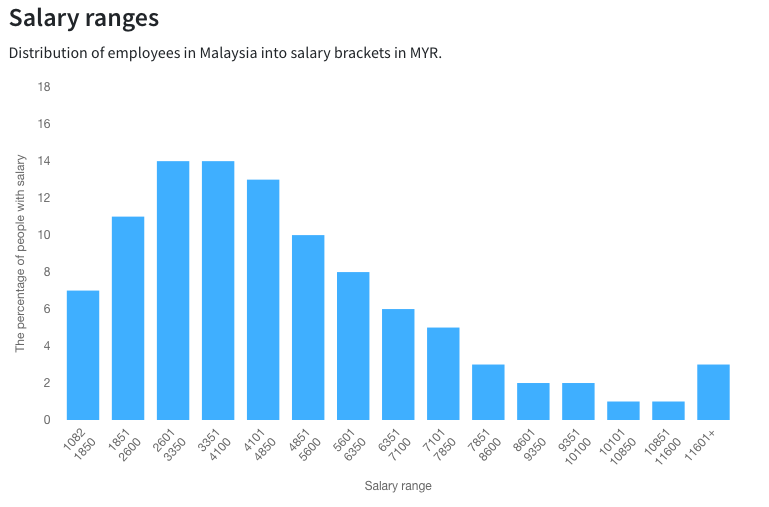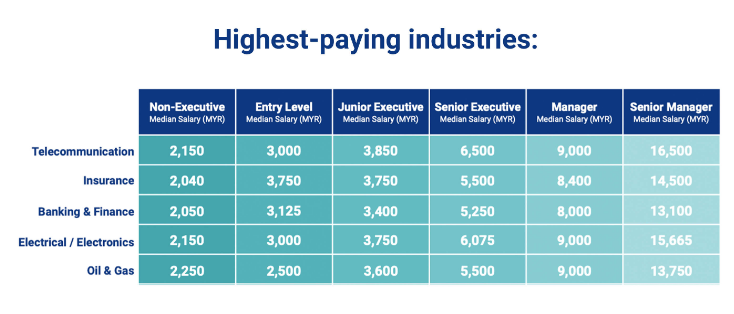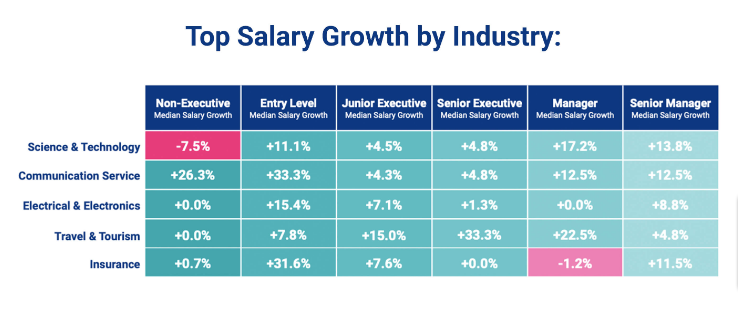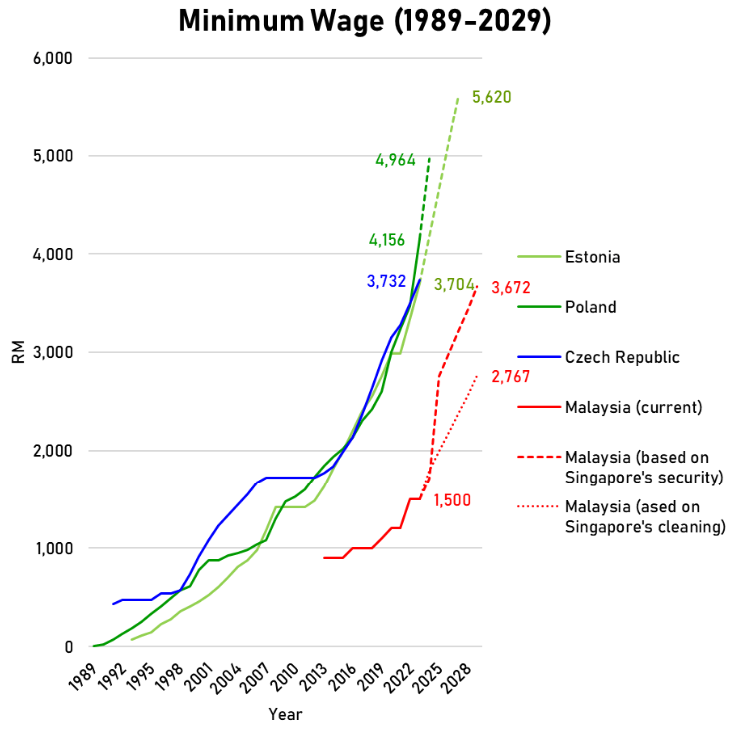On the other hand, Singapore is known for its high-income levels, with an even more marked difference compared to Malaysia. Singapore’s average annual salary is notably higher, with a reported figure of around 65,000 SGD (Singapore Dollars) per year, which is equivalent to about 47,678 US Dollars. This translates to an average monthly salary of roughly 3,973 US Dollars, showcasing a substantial gap between the two countries.
In general, Malaysia’s average salary is lower than that of other developed nations like the United States, Hong Kong, South Korea, and Singapore. While Malaysia’s average salary is higher than some of its closest neighbors, it remains significantly lower compared to these developed countries. This difference is crucial to understand, as it can impact various aspects like employment opportunities, cost of living, and overall quality of life.
Statistical Data and Charts
The Malaysian labor market has experienced fluctuations in average salaries over the years. In 2021, the median monthly salary recorded a significant increase of 9.1% to RM2,250 compared to the previous year (2020: -15.6%; RM2,062). This rise is partly attributed to the resumption of economic and social activities in the country after the challenges posed by the COVID-19 pandemic.
When examining the historical data, average wages in Malaysia were reported at MYR2,496.50 per month from 2010 to 2021. The highest average wage was recorded in 2019 at MYR3,224.00 per month, while the lowest average wage was observed in 2011 at MYR1,814.00 per month. This trend highlights the overall growth of salaries in Malaysia over the years.
To further support these findings, a chart illustrating the average monthly salaries in Malaysia can be found here. This chart displays the upward trend in average salaries from 2012 to 2021, with occasional dips due to economic circumstances and external factors.
It is essential for professionals and employees in Malaysia to stay informed about the current state of salaries and compensation in their respective fields. This information allows them to gauge their earnings objectively and make informed career decisions. Employers can also make use of this data to maintain competitive salary packages that attract and retain top talent in the market.
Companies Hiring and Paying Well
In Malaysia, there are several companies known for both hiring and offering attractive salaries to their employees. Companies such as those in the Banking and Financial Services, Business Services, Engineering and Manufacturing, Healthcare and Life Sciences, and Technology sectors are among the top employers with high-paying jobs.
Positions, like chief executive officer, chief financial officer, chief operating officer, and chief information officer in these industries, can earn a salary ranging from RM480,000 to RM800,000 per annum. Moreover, the average monthly salary for a programmer in Malaysia is RM 3,109, indicating that the technology sector is also a lucrative choice for employees.
When it comes to skill demand, project management is one of the top in-demand jobs in Malaysia. The ability to effectively communicate, organize, and adapt to changing project requirements are essential skills required for a strong candidate in this field. Employers in various industries are consistently seeking project managers to oversee and manage their projects from inception to completion.
In the capital city of Kuala Lumpur, the average salary is RM6,923, with the cost of living for a single person being RM3,300, making it 57% cheaper compared to other Asian cities. The salary average varies across the industries, with the lowest average being RM1,800 and the highest being RM31,800. This presents ample opportunities for professionals seeking well-paying jobs in Malaysia.
Malaysia offers diverse opportunities for professionals looking for attractive salaries and career growth in various industries, including Banking and Financial Services, Business Services, Engineering and Manufacturing, Healthcare and Life Sciences, and Technology. Candidates with the right skill sets, experience, and qualifications can significantly benefit from these lucrative job openings in Malaysia’s expanding job market.
Personalized Salary Report
A Personalized Salary Report is a valuable tool for individuals looking to understand their market worth in the workplace, as well as for employers wanting to ensure they are offering competitive compensation packages. In Malaysia, multiple platforms provide personalized salary reports based on various factors like job position, years of experience, industry, and location.
One reliable source for personalized salary reports in Malaysia is JobStreet’s Salary Report. This report breaks down average salary changes by industry and specialization. It also presents valuable insights into top salaries and salary growth by position level.
Another useful resource for obtaining salary data is Paylab’s Malaysia Salary Comparison. Paylab provides a comprehensive view of the average salary and salary range by age group, highlighting differences in earnings across various demographic segments.
To effectively utilize personalized salary reports, individuals should consider their skills, experience, and qualifications when comparing their salaries to market averages. This enables them to make informed decisions about their compensation, potential career paths, and negotiating power during job interviews or discussions with their employers.
Employers can benefit from personalized salary report data by adjusting their compensation packages to attract and retain top talent in their respective industries. By remaining competitive in the Malaysian job market, organizations can foster a positive working environment for their employees and promote growth.
Personalized salary reports are essential tools for both individuals and organizations in Malaysia to understand the current compensation landscape. Utilizing these reports can lead to better career decisions and foster a competitive work environment.
Department of Statistics Malaysia
The Department of Statistics Malaysia is a key government agency responsible for collecting, analyzing, and disseminating national statistics, including data on salaries and wages in the country. Through regular surveys and reports, the department provides valuable insights into the job market and income levels in Malaysia.
One of their major reports is the Salaries & Wages Survey Report, which presents data on the average salary in the country. According to a recent Time Doctor article, the average salary in Malaysia is 6,590 MYR (Malaysian Ringgit) per month or 1,485 US Dollars as of May 2023.
The department’s data also reflects the median monthly wages for different industries and regions in Malaysia. For instance, the mining and quarrying sector recorded the highest median monthly salaries and wages at RM3,921, followed by the services sector at RM2,550, as reported by Human Resources Online.
In terms of regional data, Putrajaya has the highest salaries and wages in Malaysia. Moreover, the department’s reports indicate disparities in wages among younger workers, with the median wage for Malaysians aged between 20-24 standing at RM1,682, according to iMoney.
The information provided by the Department of Statistics Malaysia plays a vital role in helping policymakers, businesses, and individuals make informed decisions and assess the economic situation in the country. By analysing the data on salaries and wages, stakeholders can get a better understanding of the job market and plan accordingly for the future.
Expected Salary for Tech Workers
The technology industry in Malaysia has been experiencing a rising trend in salaries, particularly within the tech sector. This increase can be attributed to the ongoing demand for skilled technology professionals such as software engineers, IT technicians, and other tech workers. Despite the growing trend, the average salary in Malaysia still lags behind the global industry average.
As the 5G technology continues to roll out in Malaysia, it is expected to contribute significantly to job opportunities, with an estimated 39,000 value-add jobs to be created. Consequently, this development directly impacts the salary prospects for tech workers in the country.
For software engineers in Malaysia, the salary range varies depending on factors like years of experience, industry, and location. Generally, software engineers with 0-1 years of experience can expect to receive an entry-level salary, while those with 1-3 years of experience may see a growth in their remuneration. As a software engineer’s experience and expertise increase, their salary has the potential to grow significantly within 4-6 years, 7-9 years, and 10-14 years of experience.
On the other hand, IT technicians’ average salary in Malaysia is currently around RM 2,430 per month. This figure is subject to change, particularly with the influx of technological developments and increasing demand for tech-savvy professionals in the country.
Malaysia’s technology industry is showing a positive outlook with regards to the expected salary for tech workers, which benefits both software engineers and IT technicians. This development will likely continue to attract skilled professionals to the country, ultimately boosting the nation’s economy and making Malaysia a competitive player in the global technology landscape.
Future Predictions and News
The employment market in Malaysia is showing a positive outlook for the year 2023, with salary increments predicted to return to pre-pandemic levels. The median salary increment in Malaysia is above the Asia Pacific average at 4.4%, indicating robust growth for the nation.
Malaysia is not alone in experiencing salary increases, as the Asia Pacific region is witnessing a divergence in pay progression between emerging and developed economies. Salary estimates range from as high as 7.1% in Vietnam to 2.2% in Japan, highlighting the varying rates across the region.
Employers in Malaysia are expected to offer salary adjustments of up to 20% to stay competitive in the talent market. Particularly, technology and manufacturing industries are seeing significant changes to internal salary structures as they adapt to new market demands.

